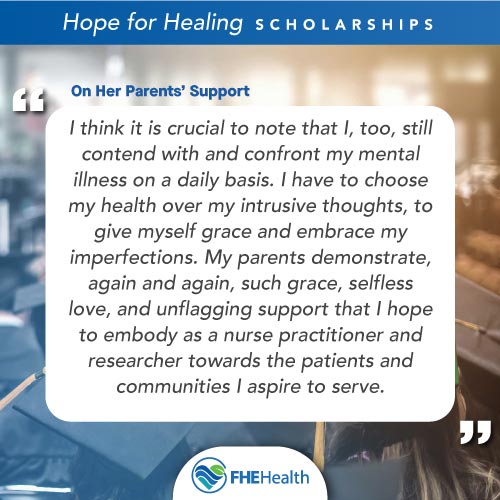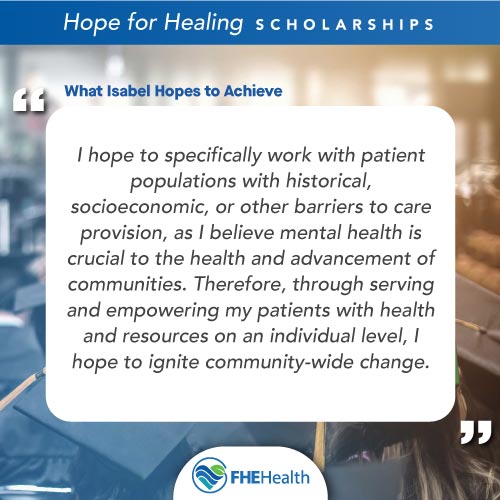
Before she went on to win this year’s undergraduate “Hope for Healing Scholarship,” Isabel Buckingham began her personal essay with the following statement: “An estimated three percent of adolescents are diagnosed with an eating disorder; the first day of summer vacation in 2016, I became one of them.”
Up until that moment in 2016, Buckingham had immersed herself in an ambitious high-school career marked by competitive running, musical competitions and a perfectionistic drive to achieve. Anorexia and “my intimate confrontation with mental illness,” as Buckingham put it, shifted that trajectory, obliging her to focus on recovery with the support of her parents and other resources from the treatment community.
How Family Involvement and Treatment Were Critical to Her Recovery
 In fact, Buckingham credits her parents for being the biggest influences and inspirations in her journey, both in her recovery from anorexia and in her decision to study nursing at the University of Pennsylvania. In an interview last week, she said:
In fact, Buckingham credits her parents for being the biggest influences and inspirations in her journey, both in her recovery from anorexia and in her decision to study nursing at the University of Pennsylvania. In an interview last week, she said:
When I told [my parents] what kind of nurse I wanted to be, they celebrated with me and continue to do so every step of the way. More importantly, they continue to encourage me through the ups and downs of my recovery. I think it is crucial to note that I, too, still contend with and confront my mental illness on a daily basis. I have to choose my health over my intrusive thoughts, to give myself grace and embrace my imperfections. My parents demonstrate, again and again, such grace, selfless love, and unflagging support that I hope to embody as a nurse practitioner and researcher towards the patients and communities I aspire to serve.
Life Lessons Learned and Insights Gained from Living with an Eating Disorder
Buckingham’s personal experience with mental illness turned up some unexpected gifts in the form of life lessons and insights:
- She developed a strong interest in the mental health field and a passion for helping people who suffer from eating disorders, depression and addiction.
- She came to see “the importance of evidence-based treatment as well as economic and familial support” in recovery from mental illness.
- She also began “to wonder what happened if there had not been such access to care,” and “this sparked an interest in serving as a nurse practitioner in mental health as well as research in health disparities in psychiatric care.”
Why Choose University of Pennsylvania for Nursing?
The University of Pennsylvania seemed like the ideal educational setting to do both of these things:
After I confirmed I wanted to major in Nursing (following a two-week program between my junior and senior years at Yale University called the National Student Leadership Conference), I created a list that was a mix of well-regarded, affordable in-state schools and nationally top-ranked nursing schools. This second group were all on the east coast, and at the top of the list was the University of Pennsylvania. It’s the only Ivy League school with a nursing program. (I didn’t even realize it was in the Ivy League until later on, as it sounds a bit like a state school to someone from the west coast!)
I decided to attend UPenn after I visited a few times over my junior and senior years. While its academic rigor and international reputation were impressive, what I loved most was the collaboration and community within the School of Nursing. Students and faculty genuinely and personally want one another to succeed. Staff individually worked with me to make Penn a financially viable option. So, although the academia of the institution initially led me to consider Penn, the supportive, interdisciplinary philosophy of the School of Nursing truly reflected the values of the nursing field.
What’s more, Buckingham said those same values led her to become a Quaker in the fall of 2018.
Research Regarding How Eating Disorders Impact Quality of Life
 At UPenn, Buckingham’s research interests led her to apply for a summer research mentorship program at the Children’s Hospital of Philadelphia. There, under the oversight of Dr. Rebecka Peebles, Buckingham set out to study the quality of life of people with eating disorders:
At UPenn, Buckingham’s research interests led her to apply for a summer research mentorship program at the Children’s Hospital of Philadelphia. There, under the oversight of Dr. Rebecka Peebles, Buckingham set out to study the quality of life of people with eating disorders:
I was trained in Quality Improvement and spent hundreds of hours reading patient medical records from the eating disorder treatment program at CHOP and summarizing their data in RedCAP databank software. From the data, I learned just how awful the quality of life (QOL) of those with eating disorders can be, regardless of their sex.
We assessed QOL through different surveys, one that was focused on eating disorders symptoms (related to perceptions on weight, eating, body image, exercise, binge/purge, etc.) and two others that asked questions pertaining to health more holistically. The results of these general measures found that both males and females suffered from an equally, devastatingly low QOL (equivalent to that of a newly diagnosed pediatric cancer patient).
These results validated my own experiences and those of male patients as well, who often face even more stigma and lack of recognition due to the female stereotype associated with the condition.
What, if anything, was most surprising about the research findings? “When analyzing results from the eating disorder-specific questionnaire, females appeared to fare worse than males. How could this be, if other results clearly showed both sexes suffering equally due to the disease?” One potential explanation was that their questionnaire asked about symptoms that were more applicable to females than males.
“This demonstrated the need for further research concerning how males express eating disorders as well as how best to measure their distress and treat their condition,” Buckingham said, when interviewed.
Already, Buckingham’s academic research findings have received international recognition, in addition to having been published here in the U.S. She helped to author a paper that will be presented at the 2020 International Conference for Eating Disorders in Sydney, Australia.
Academic and Vocational Goals in Psychiatric Nursing and Mental Health
Buckingham is originally from Longview, Washington, a small town in the Pacific Northwest. The Pacific Northwest is also where she hopes to eventually return to practice nursing, research and teach:
As a psychiatric/mental health nurse practitioner, my role will be to provide therapeutic and psychotropic medication support to those experiencing mental health issues. I hope to specifically work with patient populations with historical, socioeconomic, or other barriers to care provision, as I believe mental health is crucial to the health and advancement of communities. Therefore, through serving and empowering my patients with health and resources on an individual level, I hope to ignite community-wide change.
Buckingham added that she sees nursing research as “another method through which larger-scale change can be engendered” in the mental health field, and views the practice element of nursing as a critical stepping stone on the path towards a Ph.D.
“I need to be exposed to the issues within the system before being able to identify them as well as brainstorm and investigate solutions,” she said.
She also expressed the hope that after a Ph.D. she’ll be better positioned to redress health disparities within the mental health care system, identify new methods of treatment and care provision, and forge creative, community-led solutions to psychiatric care.
Biggest Contribution as a Future Professional in the Addiction and Mental Health Field?
 “As you think about your professional future in the field of addiction and mental health, what do you hope will be your biggest contribution?” Here’s how Buckingham answered that question:
“As you think about your professional future in the field of addiction and mental health, what do you hope will be your biggest contribution?” Here’s how Buckingham answered that question:
As a practitioner, I hope that my biggest contribution will be to improve the quality of life of individuals, to equip them with the therapeutic tools through which they can heal, improve functioning in daily life, and find fulfillment and purpose within their communities and relationships. If I am able to successfully serve one individual, providing them the tools and support to recover, I find there can be no greater contribution.
Through this focus on individuals, the communities in which they reside can also be empowered and needs can be identified. As a researcher, I hope to address these needs, disseminating potential solutions and knowledge through interdisciplinary publications. Through this approach, my goal (however lofty it may seem) is to provide equal access to evidence-based, holistic, and integrate psychiatric care to every community, starting with my own and regardless of their diagnosis, socioeconomic status, age, or insurance.
How the Hope for Healing Scholarship Will Help
As for how the Hope for Healing Scholarship will support Buckingham on her path to these and still other helpful contributions in the field of mental healthcare? Buckingham said the grant would alleviate the “significant financial burden” of college tuition and provide her with critical, educational resources in her formation as a mental health nurse.
“It has been such a privilege and honor to receive a scholarship from a health care community that is passionate about what I am passionate. I sincerely thank FHE Health for their support.”






